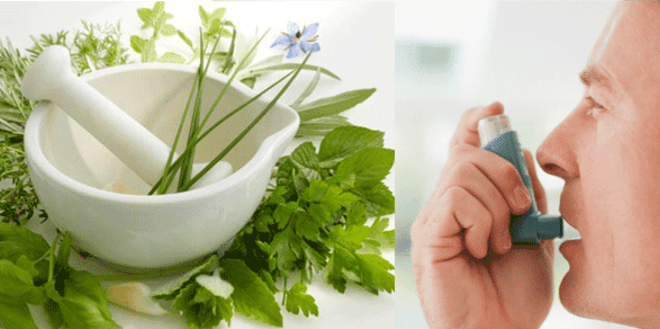Asthma is a chronic lung disease that is caused due to the inflammation of the respiratory airways. The airways get filled with mucous becoming narrower which blocks the inflow of air inside the lungs. This results in shortness of breath, wheezing, coughing and tightness in the chest. An asthma attack can be triggered by various allergens like pollens, dust, smoke, fumes or even grass. And if not controlled in time, an asthma attack can lead to breathlessness as well.
In Ayurveda, the ancient study of herbs for medicinal purposes, the entire universe including the human body is made of five elements – air, water, fire, earth and space. These five elements are present in every living thing and combine together to promote health by balancing the following three doshas.
- Pitta (Fire & Water)
- Vata (Space & Air)
- Kapha (Earth & Water)
When any of these elements are out of balance in the body, illnesses occur. Every living being has one prominent dosha than the other. As per Ayurveda, asthma is caused because of Kapha dosha. Kapha is considered as the principle for potential energy that controls the body’s stability and lubrication. It has almost mucus-like characteristics as it can be identified by its viscid, sluggish, slow, heavy, dull qualities. Brains, joints, stomach, lymphatic system, mouth, pericardial cavity and pleural cavity are some of the organs that are associated with Kapha.
Risk Factors for Causing Asthma

Some of the risk factors that can cause asthma are as follows:
- Inheriting the allergic conditions from the family
- Prolonged exposure to air pollution or burning biomass
- Exposure to cigarette smoke
- Any viral respiratory disease
- Exercise-induced bronchoconstriction
- Cold/Flu or Hay Fever
- Obesity
Types of Asthmatic Conditions
Asthma can be divided into allergic and non-allergic asthma. As mentioned earlier, in allergic asthma, allergy to the pollutants or stimulants present around the environment induce the asthma attack. Whereas, non-allergic asthma can be divided into various categories depending on the cause of the same, such as:
- Adult On-Set Asthma is caused when asthma symptoms occur in the adult phase of life, barring the childhood phase.
- Exercise-induced bronchoconstriction is caused by excessive exercise in a healthy individual.
- Occupational asthma is caused when people inhale dangerous fumes or dust particles being on their jobs.
- Childhood asthma is generally hereditary and develops in a child by the age of 5 years.
5 Ayurvedic Home Remedies for Preventing Asthma Symptoms

Ayurveda practitioners recommend the usage of multiple techniques to bring Kapha into harmony in the body. These techniques include reciting mantras, yoga, breathing exercises, dietary and lifestyle changes and using various oral and topical herbs. Here are some ayurvedic home remedies that you can use to reduce the asthmatic symptoms.
- Ginger and Garlic: Mix half a cup of ginger tea with 2-3 crushed garlic cloves and consume daily. Ginger and garlic are both known for their anti-inflammatory properties and help with the inflammation of the airways and removal of mucus thus preventing asthmatic attacks.
- Ginger and Turmeric Tea: Boil freshly grated ginger in milk and add half teaspoon of turmeric to the mixture. Boil and drink this tea twice daily to prevent asthma attacks.
- Cinnamon and Honey Tea: Add half-teaspoon of cinnamon and one-fourth teaspoon of trikatu to boiling water. Let it boil for a few minutes to derive the maximum benefits of these herbs. Cool it off a little before adding honey to it and consume twice daily.
- Licorice and Ginger Tea: Known as mulethi in Hindi, mix a licorice stick with crushed ginger in boiling water and drink this tea every day. Ginger clears airways and enables proper breathing.
- Bay Leaf: Taking half a teaspoon of crushed bay leaf, one-fourth teaspoon of pippali with one tablespoon of honey 2-3 times a day also prevents the symptoms of asthma.
Dietary and Lifestyle Changes to Prevent Asthmatic Symptoms
- Avoid air pollution and outdoor pollutants as much as you can. Wear a mask whenever you go out to filter out the pollutants or allergens from entering your respiratory tract. This precaution can also be taken on your job if you might inhale fumes, dust and smoke at your workplace.
- Factors like stress and anxiety are also triggers for asthma attacks, thus try to prevent and control these factors by doing yoga or meditation daily.
- Avoid dairy products completely if possible. Consumption of dairy causes production and accumulation of mucus.
- Inflammatory foods like white sugar, artificial sweeteners, junk and processed foods should also be avoided.
- Make sure you don’t consume cold/frozen food and beverages as they can constrict your airways quickly leading to an asthmatic attack. Whatever you eat, make sure to bite smaller pieces to avoid putting pressure on your diaphragm.
- Do not put excessive pressure on your body by exercising aggressively.
The Bottom Line
Asthma is a chronic condition that cannot be cured but prevented. These aforementioned ayurvedic practices help you in preventing the symptoms by suppressing inflammation but do not substitute these for medical advice. An asthma attack can be serious and leave you breathless. Therefore, if you are wheezing, coughing and having chest pains, seek medical help immediately.


